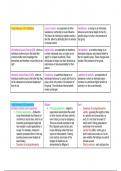Summary
Summary Psychology paper 1 definitions & evaluations
- Module
- Introduction to psychology
- Institution
- AQA
Includes some A01 definitions and evaluation points for each key study/theory including all topics in paper one except research methods
[Show more]



